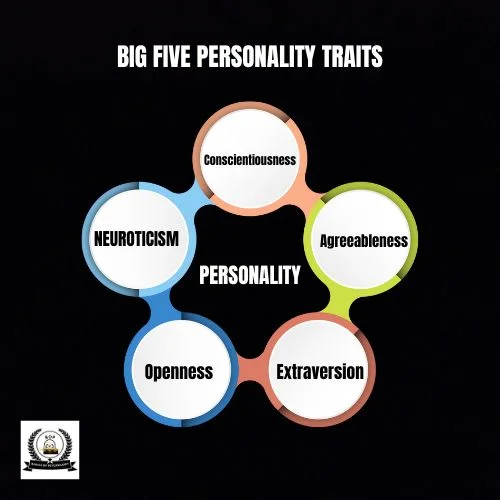As one of the most influential and revolutionary figures in psychology, Gordon Allport’s work has enormously influenced our comprehension of human behavior. His pioneering studies on trait theory, contact hypothesis and prejudice investigations have presented a more profound understanding of how individual disparities shape personality psychology.
He was devoted to investigating these themes further during his life, leaving behind a remarkable heritage that has continued to motivate psychologists even now. In this Article, we will explore his life, theories and contributions to psychology and his persisting effect on our insight concerning human conduct.
Table of Contents
Introduction to Gordon Allport and His Impact

Allport influence on psychology was extensive, starting with his trailblazing research in trait theory and extending to his study about prejudice and contact hypothesis. Allport’s contributions were not limited solely to only some specific fields; instead, he made fundamental advances across an array of topics ranging from personality through social psychology to communication studies.
In 1897, Allport was born into an environment of books in Indiana, USA. It enabled him to cultivate a fondness for reading and writing early on that would later become relevant to his career as an academic psychologist. After completing his degree in English literature from Harvard University, he registered himself at Harvard graduate school, where William James had been teaching.
This encounter profoundly impacted how Allport perceived human behaviour culminating in turning toward individual differences or traits. This topic became pivotal in his later work. Allport’s innovative research regarding Trait Theory was centred on recognizing individual qualities that remain constant over an extended period and anticipate how someone will behave; this model eventually became referred to as the “Big 5” personality traits Oopenness, Conscientiousness, Extraversion/Introversion, Agreeableness & Neuroticism).
Along with conducting investigations into Trait Theory, Allport also surveyed multifarious elements of social psychology, counting intergroup relations; it is here where he established the Contact Hypothesis, which suggests positive ties between different groups can be advanced through augmented contact.
His hypothesis has since been extensively tested throughout history, producing results of varied quality; nonetheless, it remains a fundamental part of comprehending how people communicate across different cultures or backgrounds.
Related Reading: Robert McCrae: Fueling Growth via Personality Insights
Trait Theory and Contact Hypothesis

Allport is chiefly commemorated for his pioneering work in Trait Theory, which he fashioned throughout a lifetime devoted to psychological investigation. According to the theory propounded by Allport, people are endowed with specific traits from birth that form their behaviour and can be utilized to anticipate how individuals will act.
His attention concentrated on individual traits such as conscientiousness, amiability and neuroticism and social elements like status and power. The ramifications of this concept have been far-reaching; it has been implemented into fields including marketing research to gain a better insight into consumer inclinations and behaviours.
The life and works of Allport have left an enduring imprint upon psychology along with our overall understanding of human conduct, more generally speaking. He was an imaginative thinker who devoted himself to deepening our knowledge regarding processes related to personality development, inter-group dynamics, and motivation theory – among many other topics!
Related Reading: James McKeen Cattell: Authoritative Figure in Psychology
Contact Hypothesis and its Application in Understanding Human Behaviour
Allport further developed what is known as the contact hypothesis; this supposes that making connections between members from disparate groups has the potential to decrease prejudice through heightening consciousness and comprehension. Allport believed interaction among assorted cohorts could induce greater acceptance and mutual appreciation.
He sought to assess the validity of his idea through research wherein participants interacted with people from different ethnic or racial backgrounds in various contexts, such as workplaces and schools. The results indicated that these interactions had an optimistic influence on attitudes towards those originating from distinct social spheres.
Subsequently, this has been established as one of the most efficacious means by which prejudice can be diminished, an observation reinforced over time following Allport’s initial proposal.
The implications of these findings have been far-reaching for society at large; as a result, many workplaces now try to ensure diversity among their employees to foster more harmonious working environments where respect is given regardless of any background or identity.
Parallel efforts are seen within school systems that often employ strategies designed to promote cooperative learning amongst students from different backgrounds so that conflicts due to differing beliefs and values can be reduced.
Highlighting Gordon Allport’s Exploration of Prejudice and its Origins

Gordon Allport was one of the first psychologists who carried out studies about business and its impact on individuals spanning various diversities and society at large. Allport’s focus of exploration in prejudice centred on the concept known as the contact hypothesis, suggesting that contact between two disparate social groups can reduce bias levels by causing empathy and understanding among them.
To further verify this premise, he initiated a range of experiments which established that when members from different societal classes interacted closely with each other (e.g., sitting side-by-side for lessons), over time, it resulted in significantly reduced prejudicial thinking because heightened comprehension had been achieved between them.
This research has provided insight into the importance of people from different backgrounds interacting with each other to diminish prejudice within society. Allport also devoted much attention to self-actualization, which is his view that humans have an inner desire for growth and attainment – this can be accomplished through activities such as work or leisure interests.
He suggested that these needs could only be realized when individuals felt independent of external restraints, like fear or guilt – a concept he referred to as “autonomy“; whereby they would reach their highest possible level mentally and physically.
His musings about self-actualization were highly significant when published and are still esteemed today; contemporary psychologists frequently draw upon Allport’s conceptions while examining human motivation and behaviour.
Related Reading: Lev Vygotsky: Discover His Genius Ideas
Gordon Allport’s Theories and Contributions
To ascertain Allport’s biography and his lasting legacy, one must consider both his early life experiences and career path. Allport was born in 1897 in Indiana and grew up in an intensely religious family.
At the outset of his life, various religious convictions impinged upon and informed Allport’s later works in psychology. After achieving graduation from college, he took up an instructor position at Harvard before enlisting as a soldier during World War I; it was here that he had direct exposure to how prejudicial opinions can contribute to the controversy between people hailing from different social milieus.
This occurrence made a deep impression on Allport’s subsequent research studies into prejudice and contact hypothesis, which postulates that affirmative interaction amongst members belonging to distinctive factions has the potential for minimizing prejudice by constructing comprehension among all involved parties.
Allport returned from war with an intensified interest in examining human conduct through psychology, which prompted him to acquire master’s and doctoral degrees at Harvard University under Edward Thorndike’s supervision.
When there, he wrote about various topics, including individual variations, behaviourism, psychodynamics, personality traits and attitudes toward other organizations Etc. Subsequently, two books were composed by him; Personality: A Psychological Interpretation (1937), wherein theories connected with characteristics like neuroticism or extraversion were investigated, while The Nature of Prejudice (1954) probed deeper into his inferences on intergroup relations particularly related to racial contrasts.
Allport’s influential life work is still being studied internationally due to its pertinence in understanding human practices even after various decades since it was published.
Related Reading: Sigmund Freud’s Impact: Revolutionizing Psychology
The Life and Times of Gordon Allport

Throughout his career, numerous significant contributions to psychology were made by him, especially on trait theory and contact hypothesis areas, which did not go unnoticed across multiple circles globally. He is most notably recognized for conducting extensive research into human personality through empirical studies.
His ground-breaking book, Personality: A Psychological Interpretation (1937), made a lasting contribution to psychology. This work presented an encompassing theory concentrating on the individual’s idiosyncratic characteristics rather than the more conventional psychoanalytic theories emphasizing general character categories or prototypes.
He put forward several essential principles in this book, such as functional autonomy. This idea contends that a person’s behaviour is determined by the individual’s unique abilities rather than outside forces or situational components; self-direction suggests individuals should pursue personal growth; and personalism proclaims every individual has value as an independent entity isolated from their surroundings or society.
The pioneering work of Allport was influential in developing what eventually became known as the Contact Hypothesis, which Muzafer Sherif introduced in 1954. This concept is based on the idea that building relationships between people from different backgrounds is key to promoting harmony and reducing tensions.
Before this, Allport had explored the idea and argued against stereotypes based on race, class, gender Etc., asserting instead that individuals should be judged solely upon their own merits without considering external factors such as group membership or social status.
Additionally, he proposed some strategies for minimizing interpersonal discrimination, including cooperation amongst diverse groups, increased interaction between people from various backgrounds, and education to enhance comprehension within societies divided along racial lines.
Related Reading: BF. Skinner’s Inspiring Journey
The Contemporary Relevance of Allport’s Work
Allport postulated that education could play an essential role in diminishing these apprehensions due to successful knowledge being served concerning others which would negate any unnecessary dreads potentially leading to discriminatory behaviour against such persons.
The legacy left by Allport is formidable, but one particularly paramount contribution he made concerned understanding how individual faculties work together with their environmental surroundings; since its conception many years ago, this concept has had profound importance within psychology.
Conclusion
In conclusion, Gordon Allport was a pioneering figure in psychology who had an immense impact on its comprehension and human conduct. His investigations into trait theory, contact hypothesis and prejudice have been some of the most momentous works within personality psychology and studies concerning individual divergence. Consequently, his life’s work has left behind an enduring legacy that generations will study for years to come.
Join Us
Do you want to investigate the human psyche and unlock its capability? Join us to find out additional about the spellbinding field of psychology! Everybody, regardless of whether they are an amateur student or knowledgeable proficient, can profit from what we bring to the table. Our addresses, Researches, and Articles exhaustively review subjects such as youth improvement and clinical psychology.













